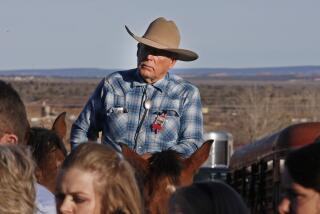Babbitt Resumes Work on Grazing Policy Reform : Livestock: In the first of several hearings, Interior secretary seeks plan on public lands use to please cattlemen and environmentalists.
- Share via
BOZEMAN, Mont. — Having gained nothing but grief in Washington, D.C., with its plan to reform public lands management in the West, the Clinton Administration came to the West on Friday to try afresh.
Facing a room brimming, so to speak, with oversized cowboy hats and scuffed hiking boots, representing both ranchers and environmentalists, Interior Secretary Bruce Babbitt indicated that the Administration wanted to proceed carefully in increasing grazing fees and stewardship requirements for livestock users of federal lands. He said he hoped to have a plan presented by autumn.
Babbitt said he was mindful that President Clinton had done well in the West in the November election and did not want to jeopardize that support. Babbitt said the President instructed him to devise a plan that is especially sensitive to family ranchers.
“He told me he wasn’t going to be part of something that increases the hardship of people who live on the land,” said Babbitt, himself born into an Arizona family rooted in ranching.
This was the first of several round-table hearings Babbitt has scheduled to give the public its say on one of the oldest and most rancorous arguments in the West: How much should ranchers pay to fatten their sheep and cows on federal lands? How much more can they pay without being driven out of business? And, how much damage should public lands and wildlife endure for grazing?
These old questions were supplemented with new ones just as difficult, such as: If ranchers call it quits and sell out their best private holdings to recreational homesteaders, will the larger environmental consequences be worse than subsidized grazing? Or, is livestock grazing compatible with the nation’s growing concern with wildlife diversity and endangered species?
The U.S. Forest Service and Bureau of Land Management typically charge less than $2 monthly for every cow or every five sheep on federal grazing land. Government reports indicate this has resulted over time in a large public subsidy of the livestock industry.
Environmentalists argued the price should be raised to “fair market value” of $8 to $12 per cow or five sheep. Ranchers said this is an absurd demand that would drive them out of business. Some ranchers acknowledged that a modest increase is probably inevitable, but others defended today’s fees as a bargain for taxpayers in providing low-cost meat.
Montana Lt. Gov. Dennis Rehberg testified that rangelands are in better condition than when Lewis and Clark passed through Montana in 1804 and that wildlife populations are at a 100-year high.
“Through our grazing permit holders, our public lands are cared for at very little or no expense to the federal budget,” Rehberg said.
Environmentalists called these claims preposterous. A fact sheet distributed by the National Wildlife Federation said that only 5% of the Old West populations of bison, elk and antelope still exist today. The organization said that 31 of 39 species of endangered or threatened species managed by the BLM are harmed by livestock.
Testifying for the wildlife federation, sheep rancher Kathleen Hadley cited government studies showing that “overgrazing had reduced the number of wildlife species by half” in portions of Oregon. In one grazing district, she said, the BLM allotted 252 million pounds of forage to livestock “and a measly 8 million pounds to wildlife.”
Trampling of stream banks, water pollution due to concentrations of animal waste and denuding of fragile grasses that lead to erosion are problems frequently associated with intensive grazing. Fences and water developments cause other consequences.
Earlier this year, the Clinton Administration sought an increase in grazing fees on more than 200 million acres of public lands--along with reform of mining claims and public forest harvest--as part of its plan to balance the federal budget.
But Western senators, whose votes were important on the President’s other economic initiatives, voiced opposition, and Clinton hastily backed down. Environmentalists were stunned at the swiftness and ease of Clinton’s surrender, with one conservation leader calling it a romance that had turned into “date rape.”
The Administration tried to recover by saying it would seek grazing reform separately, apart from the budget process. Throughout, Babbitt said he remained determined to achieve public lands reform, although his reassurances Friday that he would not impose hardship on family ranchers was understood by some to be a qualification of that commitment.
One after the other, ranchers took the microphone to plead. There will be no new generation to continue ranching in their families if public lands grazing fees are increased, they said. These ranchers described their “ranches” as a combination of their private property and their federal leases, and in many cases feel they are within their rights to bar public access to the federal lands. Some 5 million acres of federal grazing allotments are inaccessible to the public in Montana alone.
Brad Little of the Idaho Wool Growers said that a fee increase to $8.70 per month for every five sheep would entirely eliminate sheep grazing on federal lands in Idaho.
Many of these same ranchers pay more than 10 times the federal fee to graze livestock on private pastures, but the difference is in the level of water, fencing and other service provided, the ranchers argued.
Under the law, the Clinton Administration has the power now to raise grazing fees. Congress likewise is considering action on its own, as it has for years with increasing prospects of success each session.
Montana’s lone congressman, Rep. Pat Williams, conceded that increased grazing fees were “quite likely” in the next year. But he told Babbitt to be mindful that “cattle are more important to Montana than corn is to Kansas and oranges are to Florida.”
In arranging these round tables on grazing--some in the audience called them a political “talk show”--Babbitt indicated he wanted Westerners to begin thinking not only about the question of simple fee increases, yes or no, but also how to devise a grazing program that rewards good land stewardship.
The Interior secretary said these round tables were only a start toward grazing reform. “I’m going to be back in Montana talking until everyone’s so tired of talking that they have nothing left to say,” he said.
This was in contrast to a speech Babbitt delivered in Washington, D.C., on Tuesday in which he sounded a more impatient note. At the National Press Club, he pledged to make 1993 the year of a “new American land ethic” and said reforms would be founded on the national interest, not special or regional interests.
“It’s simply unreasonable to say to the American people, everyone’s going to pay their fair share, except miners, timber companies, ranchers and reclamation water users,” he said in Washington.
Subsequent round tables on grazing are scheduled for Reno, Nev.; Grand Junction, Colo., and Albuquerque.
More to Read
Sign up for Essential California
The most important California stories and recommendations in your inbox every morning.
You may occasionally receive promotional content from the Los Angeles Times.













